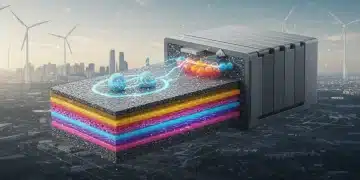Hydrogen fuel technology updates: what you need to know

Hydrogen fuel technology offers a sustainable energy solution with zero emissions, but it faces challenges such as high production costs, lack of infrastructure, and public perception issues that need to be addressed for widespread adoption.
Hydrogen fuel technology updates are shaping a new era in energy solutions. Have you ever wondered how these advancements could influence your daily life and the environment? Let’s dive in!
Current trends in hydrogen fuel technology
Current trends in hydrogen fuel technology are rapidly evolving, showcasing significant advancements that can change the landscape of renewable energy. With a global shift towards sustainability, these technologies are gaining traction.
Increased Investment in Hydrogen Projects
As governments and private sectors recognize the potential, investments in hydrogen projects are rising. Countries are collaborating to create hydrogen infrastructures that support cleaner energy solutions.
- Growth in public and private funding
- Development of hydrogen hubs worldwide
- Partnerships between governments and companies
These collaborations pave the way for innovative developments and more efficient production methods.
Advancements in Production Techniques
Another key aspect is the progress in hydrogen production methods. Technologies like *electrolysis* and *gasification* are becoming more efficient and cost-effective. Innovations focus on reducing energy consumption and using renewable energy sources for production.
By using renewable sources, we ensure that hydrogen fuel remains a clean alternative. The role of water electrolysis, especially powered by solar and wind energy, is vital because it allows for the generation of hydrogen without harmful emissions.
Integration with Other Renewable Sources
A noteworthy trend is the integration of hydrogen fuel with other renewable energy sources. For instance, combining hydrogen technologies with solar or wind energy can enhance energy reliability and efficiency. Such integrations help in energy storage, balancing supply and demand.
The fusion of these technologies can lead to a more resilient energy ecosystem. As we look toward the future, the potential synergies among renewables and hydrogen will be crucial.
Recent breakthroughs in hydrogen production

Recent breakthroughs in hydrogen production have opened new doors for cleaner energy solutions. Innovations are making hydrogen generation more efficient and sustainable.
Advancements in Electrolysis
One of the most exciting developments is in electrolysis technology. Researchers are making it possible to produce hydrogen directly from water using electricity.
- Improved efficiency with new catalysts
- Reduction in energy costs
- Integration with renewable energy sources
This method has significant potential, especially when powered by solar or wind energy, making it a clean option for hydrogen fuel.
Innovations in Biomass Gasification
Another area of interest is the gasification of biomass. This process converts organic materials into hydrogen-rich gas. Recent innovations are optimizing the conversion rates and reducing byproducts.
By using agricultural waste or other biomass, we tackle both waste management and energy production. This dual benefit enhances sustainability.
Utilization of Waste Materials
Recent studies also focus on using waste materials for hydrogen production, such as plastics and other non-recyclables. This approach not only generates energy but also minimizes landfill waste.
Technologies are evolving to extract hydrogen from these materials efficiently. As we solve waste issues, we also produce valuable energy resources for the future.
Impact of hydrogen fuel on transportation
The impact of hydrogen fuel on transportation is transforming how we think about moving goods and people. With the rise of sustainable energy, hydrogen vehicles are becoming a viable alternative to traditional fossil fuel-powered options.
Hydrogen-Powered Vehicles
Hydrogen fuel cell vehicles (FCVs) are gaining popularity. These vehicles use hydrogen to produce electricity, offering several advantages.
- Zero emissions, reducing air pollution
- Quick refueling times compared to battery electric vehicles
- Long driving ranges on a single tank
Many major automotive manufacturers are now investing in hydrogen technology, recognizing its potential to clean up urban transport.
Public Transportation Innovations
Public transportation systems are also exploring hydrogen solutions. Cities are experimenting with hydrogen buses and trains as part of their efforts to reduce carbon footprints.
These innovations not only improve air quality but also encourage more people to use public transit, helping to ease congestion. By integrating hydrogen fuel, cities can create cleaner, more efficient transportation networks.
Challenges and Future Outlook
Despite its promise, there are challenges in the widespread adoption of hydrogen fuel. Infrastructure development for hydrogen refueling stations is still lagging in many areas.
However, as investments increase and technology improves, the future looks bright for hydrogen in transportation. The combination of lower production costs and enhanced technology will likely make hydrogen vehicles a mainstream option.
Challenges facing hydrogen fuel technology

Challenges facing hydrogen fuel technology are crucial to understand for its future development. As promising as this energy source may be, several obstacles remain.
Infrastructure Development
A significant challenge is the lack of infrastructure for hydrogen production and distribution. For many regions, building a network of refueling stations is still in its infancy.
- High costs associated with developing hydrogen refueling stations
- Limited availability of hydrogen transport pipelines
- Need for standardization across regions
Without these essential infrastructures, widespread adoption of hydrogen fuel vehicles becomes difficult.
Production Costs
The production of hydrogen fuel is still relatively expensive. Most methods of hydrogen production, such as electrolysis, require considerable energy and investment.
While innovations are underway to lower these costs, many production methods remain reliant on fossil fuels, challenging the sustainability of the entire process.
Public Perception and Awareness
Public perception also poses a hurdle for hydrogen fuel technology. Education about the benefits and safety of hydrogen as an energy source is critical. Misconceptions about hydrogen being dangerous can deter potential users.
Efforts are being made to increase awareness and promote the advantages of hydrogen as a clean fuel option. As understanding grows, so will acceptance in the market.
FAQ – Frequently Asked Questions about Hydrogen Fuel Technology
What are the main benefits of hydrogen fuel technology?
Hydrogen fuel technology offers zero emissions, fast refueling times, and the potential for long driving ranges in vehicles.
What are some challenges facing hydrogen fuel adoption?
Key challenges include the lack of refueling infrastructure, high production costs, and public perception issues regarding safety.
How does hydrogen fuel impact public transportation?
Hydrogen fuel can help reduce air pollution in public transportation by providing cleaner energy for buses and trains.
What steps are being taken to improve hydrogen fuel technology?
Innovations in production methods and increased investments from both the public and private sectors are accelerating advancements in hydrogen fuel technology.





